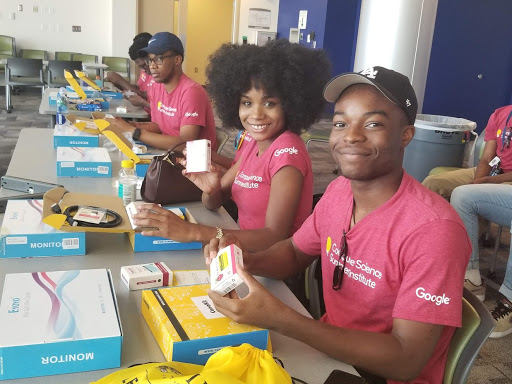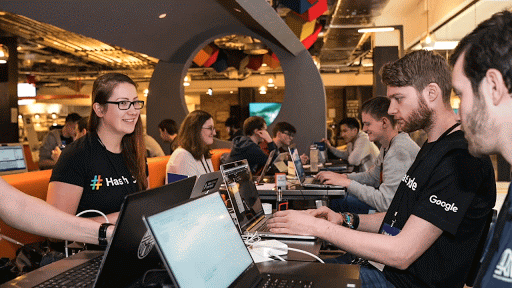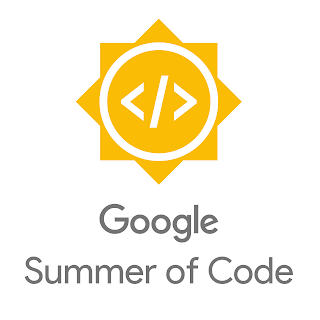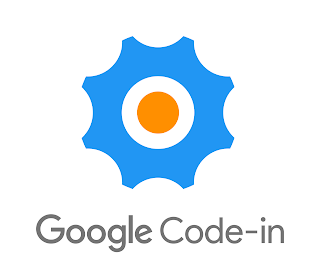In honor of Hispanic Heritage Month (Sept 15 - Oct 15), Google hosted a
Pay It Forward Challenge to recognize Latinx/Hispanic student leaders who are advancing opportunities for their local communities. We ended up receiving so may great submissions that we decided to make this a three-part blog series. This is the final piece. We’re excited to share the work of the students below and hope you’ll be inspired by their stories.
ICYMI, be sure to check out
Part 1 and
Part 2 of this post.
Diana Lee Guzman |
| Diana Lee Guzman is a recent graduate from New York University with a B.S. in Computer Science. She grew up in Phoenix, AZ in a primarily Latinx community. She is currently the Founder/CEO of Coding in Color and a Software Engineer at Boeing. |
Diana started her non-profit,
Coding in Color, with the purpose of providing educational resources to underrepresented students in computing. “Over the past 9 months, I had the pleasure of working alongside two of my amazing high school colleagues, Lirio and Robert, to create a Summer Coding Camp, specifically for our community. We worked alongside our high school administration (
Carl Hayden Community High School) where they provided us with a classroom and computers. The course was sponsored by individual members of the community who helped with supplies and providing stipends for students. I taught the course for three weeks where we covered topics such as Web Development, Object Orientated Programming, Robotics, and Artificial Intelligence.”
After the course ended, Diana continued mentoring, and along with her mentee, created websites for two local Latina business owners with businesses catering towards the Spanish speaking community.
What inspires Diana about Hispanic Heritage Month
"What I enjoy the most about Hispanic Heritage month is being able to see all these amazing opportunities being acted on by people just like me, people who speak like me, eat some of the same food as me and listen to the same music as me. I enjoy seeing the celebration of our cultures and accomplishments and it always makes me hopeful that the next generation, next graduating class, next wave of us will be able to accomplish more than we ever have."
Katerina Alvarez |
| Katerina Alvarez is a Posse Foundation Scholar at Mount Holyoke College studying Statistics and Sociology. Katerina is a Latina civic leader and STEM advocate committed to “engaging purposefully in mutually-beneficial community partnerships to advance social justice, education and community development with tech.” |
Through her work as a
Mount Holyoke Community-Based Learning (CBL) STEM Fellow for The Care Center, a transformative education program, Katerina helps support and empower young Latinx mothers to complete their high school equivalency exams and pursue higher education and successful careers in tech.
“For the past year, I've recruited over 50 Spanish-speaking tutors and developed an innovative partnership with
Makerspace – a laboratory on campus which aims at inspiring and educating underrepresented women in STEM by blending the arts and sciences together to create fun and engaging workshops. As I continue collaborating with The Care Center, I am also mentoring and supporting 30 other CBL Fellows, to help them build successful and sustainable partnerships with their community partners.”
Katerina’s advice to others"Remember: Never assume, be transparent, and complete a '360 review' frequently, so you may learn from the organization and volunteers about what is and what isn't working."
What inspires Katerina about Hispanic Heritage Month"Hispanic Heritage Month inspires me because it reminds me of my Cuban grandparents who taught me the importance of perseverance, determination, and believing in the unbelievable. I remember my grandfather, a 90-year old tennis player and painter, vividly sharing their story of love and sacrifice as they immigrated to the US while my wise and practical grandmother fact-checked him along the way. They've empowered me to embrace my roots and live my best life with passion and resilience. This month, and every month, I celebrate Hispanic Heritage Month for my grandparents, Aba y Abu."
Angel Ortega |
| Angel is a graduate student at The University of Texas at El Paso. He was born and raised in Mexico City before moving to El Paso to seek an education. He is an avid learner with interests in technology, culture, foreign languages, and education. He is also a big Harry Potter fan. |
Angel has been a long-time member of the
Sol y Agua Project. The Sol y Agua Project aims to attract middle school students, specifically minorities, from the Rio Grande Region into STEM fields and careers with a focus on water sustainability, biodiversity, and the human-impact on the environment. “I combined my passion for technology and education with my background as a minority, international student, and Computer Science major to teach children in El Paso about computing, computational thinking, and water.” His goal is to help and inspire young students to pursue a higher education, ideally in STEM.
Angel is also very active in the
Computing Alliance of Hispanic Serving Institutions (CAHSI). He was recently selected as a CAHSI Scholar and currently acts as the CAHSI Student Coordinator for the
Google TechExchange Program.
Angel’s advice to others“Sometimes the things with the most impact are those that seem the least significant. You'll never know how impactful you can be, until you try. Go out there and be the change you want to see in your community.”
Orlando Gil
 |
| Orlando lives in Harlem, New York. He is graduating soon from Baruch College with a concentration in Data Analytics. |
On campus, Orlando helped over 30 undocumented students share their stories in a university publication. “My mission is to uplift the contributions of immigrants in American society, and positively shape the rhetoric towards undocumented immigrants. It has taught me the value of owning one's story and using it to combat stereotypes.”
As an intern at the U.S. House of Representatives, Orlando helped lobby on behalf of undocumented students such as himself and “bring light to the various issues faced by those of us who are currently DACA recipients.”
“Although the efforts to pass the DREAM Act, a legislative solution, were not successful, I see far more value in the self-determination of immigrants as natural entrepreneurs. For that reason, I am passionate about helping undocumented entrepreneurs bridge gaps in business and technical expertise.” This is why he has launched his new initiative – Dream Ventures NYC. “Dream Ventures is a springboard for innovation, education and communal entrepreneurship within the immigrant community. We help ‘UndocuPreneurs’ finance their bold ideas, and pair them with experienced advisors.”
Through advocacy, Orlando has been able to share and perform his writing at various magazine launch events, festivals, and television.
Orlando’s advice to others
“Know yourself and understand your ties to your own community. It will reinforce your passion for helping and persevering through constant challenges. Also, analyze your available network and see how you can create value. Value is not always determined by the structure of power—one may not have the power to bring about overnight change, but one can gradually and creatively find the resources to do so.”
Andreina Martinez
 |
| Andreina Martinez is currently a senior at The City College of New York majoring in Psychology with an interest in public service. She is from the Dominican Republic and came to the United States in 2010. |
Andreina volunteers as a High School Educator, with
Peer Health Exchange, an organization that wants to provide young kids with the right tools and information to make smart decisions about their health. She previously interned with the New York State Senate where she focused on constituent casework ranging from housing issues to military benefits. After spending last summer in Washington D.C “interning and learning more about the legislative process our nation goes through,” Andreina took on another internship in the New York City Council where she works to help low income communities and immigrants.
Andreina’s advice to others"We don't know who we can impact with our actions and even with our words. It's extremely important to know the value of your voice and your story, when you are able to share those things with the world you will see change in your communities. Give it a try!"
Itzel Tapia
 |
| Itzel is currently a junior attending the University of Texas at Dallas full-time on a full scholarship. She is majoring in Software Engineering and Artificial Intelligence with a minor in Cognitive Science. She was born in Dallas, Texas, after her parents immigrated from Mexico. She is the first person in her family to attend college, and has a three year old daughter. |
|
When Itzel returned to school in 2016 she began volunteering at with Phi Theta Kappa Honor Society in the form of scholarship fundraisers, food drives, and mentorship. This is where she found her passion – helping other students.
Itzel began mentoring classmates on the abundance of resources available to help them succeed. This led to helping with scholarship applications, class registration, major exploration, university admissions, and even tutoring. Eventually she began reaching out to high school juniors and seniors who desperately needed help navigating their last years of high school, in preparation for college.
“It is so common to encounter Hispanic students who are intimidated and thus unsure of whether they should attend college. There is so little help offered in the advising offices, and so many resources that go unused. I’ve always loved research, so collecting a growing list of resources, scholarship opportunities, and the like came naturally – once I knew where to look.”
“First-generation college students cannot count on the experience of our parents to help guide us in our journeys, we rely solely on our own grit, and the few generous mentors we encounter along the way. I felt personally responsible to be that mentor to every student I met who needed help.”
Itzel is also passionate about increasing the interest of girls and women in STEM. She has begun mentoring girls who cannot afford coding/robotics camps, and hopes to inspire them and give them the self-confidence to become the engineers, scientists, and doctors of the future.
What inspires Itzel about Hispanic Heritage Month?
“I am inspired by the stories of other Latinx who come from humble backgrounds and still find their own ways to help our community. It’s a powerful thing to see a mother of four, raising money for scholarships by throwing a Tamalada. It gives great comfort knowing that I’ll never be alone, and that no matter what, someone will always step-in to offer me their help with a few Tamales in tow.”
Keep up with us on social (
Twitter,
Instagram,
Facebook,
G+,
YouTube) to hear more about our initiatives!


























